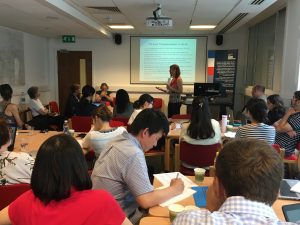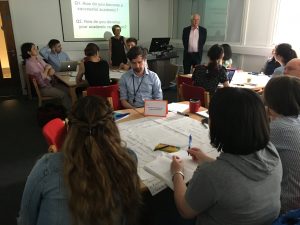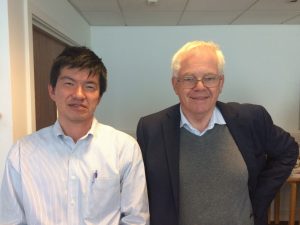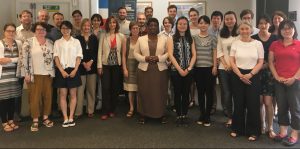Visiting Place: London, UK
Visiting Date: June 19 – 23, 2017
Overview: Report on the Summer School for Research Associates at UCL
A report contributed by: Kiyomi HORIUCHI, postgraduate student, RIHE
The Summer School for Research Associates, who are committing to the international research projects by University College London (hereafter, UCL), was held from 19th to 23rd of June at London. As RIHE has been one of its eight partner institutions abroad, I was given the opportunity to participate in this a-week-long training session as one of the RAs.
This research projects relating to the studies of higher education have been conducted by the Center for Global Higher Education (hereafter, CGHE), a subsidiary institute to UCL. From RIHE, Professor Futao Huang has been involved in two projects: 1) Local and global public good contributions of higher education: a comparative study in six national systems, and 2) Internationalisation of higher education as a public good: a comparative study in four national systems.
The Summer School was designed for building more collectively coherent and more capable research staff, and strengthening both internal CGHE ties and research networks worldwide. A total of 20 RAs, including four from partner institutions abroad (South Africa, China, and Japan), participated in this training session. In addition to the practical skill building sessions such as “Getting Research Funding,” “Career Development,” and “Media and Social Media Engagement,” various content-based sessions were provided in order to gain a stronger grasp of research in higher education studies. In the session entitled “Brexit Panel,” the withdrawal of UK from the European Union and its uncertainty on higher education were lectured especially focusing on the anti-migration rhetoric. Numerous anxieties were shown, at subsequent discussion, by London-based RAs regarding the future risks of higher education in line with anti-globalism, and I was able to realize how huge shadow Brexit has casted over the future of British and European universities.
On the final day of sessions, the competition on a bid for research funding was held. Here, all participants submitted a bid for funding (approximately three page long) on respective research topic of their interests, and also scored other’s bid as a member of review committee. “The institutional influences of English-medium degree programs at Japanese universities” was the topic I chose as my bid application. It was uncertain if I could convince especially those living in English-speaking countries of special circumstances on Japanese higher education, however, fortunately my bid was awarded as Third Prize.
The “impact” by research was the most impressive term that remained in my heart throughout this summer school. In UK, the resource allocation for research is determined by several evaluation measures by government, and thus, researchers as well as universities are required to validate its impact on society in applying for funds. It is not always feasible to measure the effect in education, and some British universities show their complaints toward the excessive metrics-based educational policies. Nonetheless, researchers are responsible for the validity whenever research is funded by public expenses, therefore, I would bear in mind its attitude of pursuing social contributions on my future research activities.
Center for Global Higher Education, UCL

Summer Session in Progress


With Professor Simon Marginson, Director of CGHE

Collective photo of participants
|
DAY 1 |
Getting Research Funding |
Jacob Leveridge |
Deputy Director of Research Facilitation, UCL |
|
Phenomenography |
Paul Ashwin |
University of Lancaster |
|
|
DAY 2 |
What is Higher Education Studies? |
Simon Marginson |
Director of CGHE, UCL |
|
Career Development |
Claire Callendar |
Deputy Director of CGHE, UCL |
|
|
Social Network Analysis for the field of Higher Education |
Golo Henseke Giulio Marini |
CGHE, UCL CGHE, UCL |
|
|
Forces that shape private higher education: the UK and Ireland |
Steve Hunt Andrew Gibson |
CGHE, UCL Dublin Institute of Technology |
|
|
DAY 3 |
Media & Social Media engagement |
James Russell |
Media Relations Officer, UCL |
|
Media Relations – an overview |
Anna Phillips |
Communications and Digital Engagement Officer, CGHE, UCL |
|
|
Promoting your research |
Fran Abrams |
Joint Chief Executive, Education Media Center, UCL |
|
|
Brexit Panel |
Rosemary Deem, Anne Corbett, Vassiliki Papatsiba |
Royal Holloway University LSE University of Sheffield |
|
|
EU and the public economy in Higher Education and Science |
Giulio Marini |
CGHE, UCL |
|
|
How can socio-history help understand changing representations of international students? |
Aline Courtois |
CGHE, UCL |
|
|
Compliance and contestation in the neoliberal university |
Aniko Horvath |
CGHE, UCL |
|
|
DAY 4 |
Cultures of counting: responsible metrics for higher education and research |
James Wilsdon |
University of Sheffield |
|
Mobility issues: international students; culturally plural HEIs; refugees |
Rachel Brooks, Vassiliki Papatsiba, Johanna Waters, |
University of Surrey University of Sheffield University of Oxford |
|
|
The contribution of research and innovation to productivity |
Kevin Fox |
University of New South Wales |
|
|
Impact / Research fish |
Joseph Lovell |
Head of Research Impact Curation and Support, UCL |
|
|
Higher Education Governance |
Jurgen Enders |
University of Bath |
|
|
DAY 5 |
Research issues in digital global higher education |
Diana Laurillard Eileen Kennedy |
CGHE, UCL CGHE, UCL |
|
Global higher education and marketization |
Susan Robertson |
University of Cambridge |
|
|
Reviewing research funding bids in groups |
Carolyn Gallop |
CGHE, UCL |
|
|
Feedback |
Simon Marginson |
Director of CGHE, UCL |
